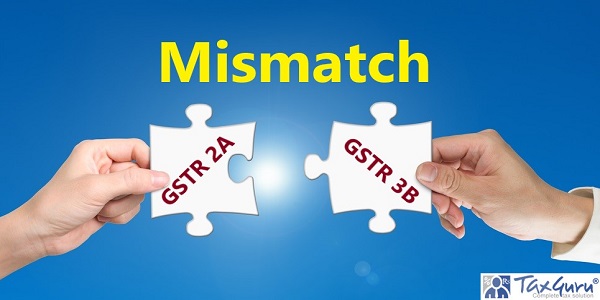Since the introduction of GST in 2017, the state and central departments have aggressively pursued assessees on the grounds of mis-match between the data reported on the GST portal under GSTR 2A and GSTR 3B. The officials have denied ITC to the assessees merely on the basis of such mis-match reports. This issue has been a significant area of concern for various taxpayers, who are unable to take the benefit of ITC.
GSTR 3B is a monthly summary return which contains the details of the inward and outwards supplies of the taxpayer during the month. While on the other hand, GSTR 2A is an auto-generated report for the recipient by the portal which uses the data submitted by the suppliers in their GSTR-1. While the intention behind the law to ensure correct data and records is well, the practical application of the same has been a bone of contention of the taxpayers.

A number of suppliers fail to report appropriate data in their GSTR-1 due to various reasons such as incorrect GSTIN, incorrect invoice no., belated reporting, etc. When this data is taken by the system and matched with the GSTR-3B of the recipient, it shows a mis-match. The Department denies such credit to the recipient taxpayer. However, the recipient in most of the cases would have already discharged its tax liability by making the payment of tax alongwith the invoice amount to the supplier and thus loses out on valid ITC.
This issue is however not new for the taxpayers operating under the VAT regime. Similar litigations were also initiated under the VAT regime where the buyer of the goods was denied the benefit of the ITC on the grounds that the seller had not reported the transaction or paid the tax to the government. In a majority of these cases, the transaction even if reported could not be matched due to some details not input correctly. These minor errors led to substantial blockage of credits to the buyer and compliance burden. The High Courts of various states in a series of judgments have subsequently held that though there may be a mis-match between the transactions reported by the buyer and seller, it is the responsibility of the Department to investigate the matter and find if the seller had paid taxes on the same or not. Further, if the buyer has reported the transactions, the Department should inquire with the seller as to why the taxes in respect of such transactions where not paid. The courts clearly held that the action of the state tax departments to outrightly deny the ITC is devoid of any merits.
The most notable decision on this aspect under the erstwhile VAT regime was delivered by the Hon’ble Delhi High Court in the case of On Qeust Merchandising India Pvt. Ltd. Vs. Govt of NCT of Delhi wherein the hon’ble court held as follows:
“53. In light of the above legal position, the Court hereby holds that the expression „dealer or class of dealers‟ occurring in Section 9 (2) (g) of the DVAT Act should be interpreted as not including a purchasing dealer who has bona fide entered into purchase transactions with validly registered selling dealers who have issued tax invoices in accordance with Section 50 of the Act where there is no mismatch of the transactions in Annexures 2A and 2B. Unless the expression „dealer or class of dealers‟ in Section 9 (2) (g) is „read down‟ in the above manner, the entire provision would have to be held to be violative of Article 14 of the Constitution.
54. The result of such reading down would be that the Department is precluded from invoking Section 9(2)(g) of the DVAT to deny ITC to a purchasing dealer who has bona fide entered into a purchase transaction with a registered selling dealer who has issued a tax invoice reflecting the TIN number. In the event that the selling dealer has failed to deposit the tax collected by him from the purchasing dealer, the remedy for the Department would be to proceed against the defaulting selling dealer to recover such tax and not deny the purchasing dealer the ITC. Where, however, the Department is able to come across material to show that the purchasing dealer and the selling dealer acted in collusion then the Department can proceed under Section 40A of the DVAT Act.”
The above decision was subsequently also upheld by the Hon’ble Supreme Court. In essence, the courts have repeatedly held that the failure to deposit tax is the liability of the selling dealer and a bonafide purchaser should not be punished for the same.
Recent relief for taxpayers under GST
Even under GST, the Madras High Court has echoed similar sentiments, wherein the Hon’ble court in the case of M/s D.Y.Beathel Enterprises Vs. the State Tax Officer held that when the buyer has proved that it has made the payment of invoice alongwith the tax components, the Department should investigate the seller for the failure on his part to make payment of tax.
The court enunciated the same principles as under the VAT laws and decided that if the taxes has not been paid to the government for a particular transaction, the Department should try to recover such taxes from the seller first. This decision provides major relief to taxpayers who are denied the benefit of ITC despite having made the payment of full taxes to the seller.
However, despite the present decision, there are still some unanswered questions looming before the taxpayers. The court did not discuss as to what establishes the bonafide of the buyer.
Admittedly, the Department will have to take cognizance of the above decision and also invoke investigations against the seller, however, it doesn’t preclude them from initiating investigations against the buyer also.
The Department normally takes several steps such as denial of ITC, imposition of interest and penalty on the buyer. In our considered view, the buyer should be ready with sufficient documents and proof to establish their bonafide such that the liability to avoid these liabilities.
The buyer can take several steps to ensure that they can prove their bonafide to the Department by tightening their scrutiny and checks around purchases and also ensuring that the purchases are made from trustworthy dealers who are compliant with the law.
*****
We at MCD Partners have assisted various business in establishing best practices to ensure that their ITC is secure in the future and have also represented the taxpayers before various forums to defend their ITC in such circumstances. The outright denial of ITC by the Department needs to be dealt with proactively and through a proper legal approach. The recent developments under GST support the taxpayers, however, the responsibility of ensuring that the benefit of such updates can be availed lies on the buyers who should ensure proper compliances at their end.






very well explained and timely also. THANKS.
Fine and fantastic article. Superbly narrated. Appreciate the efforts of the author and expect to continue more articles from them in future. Thqs.